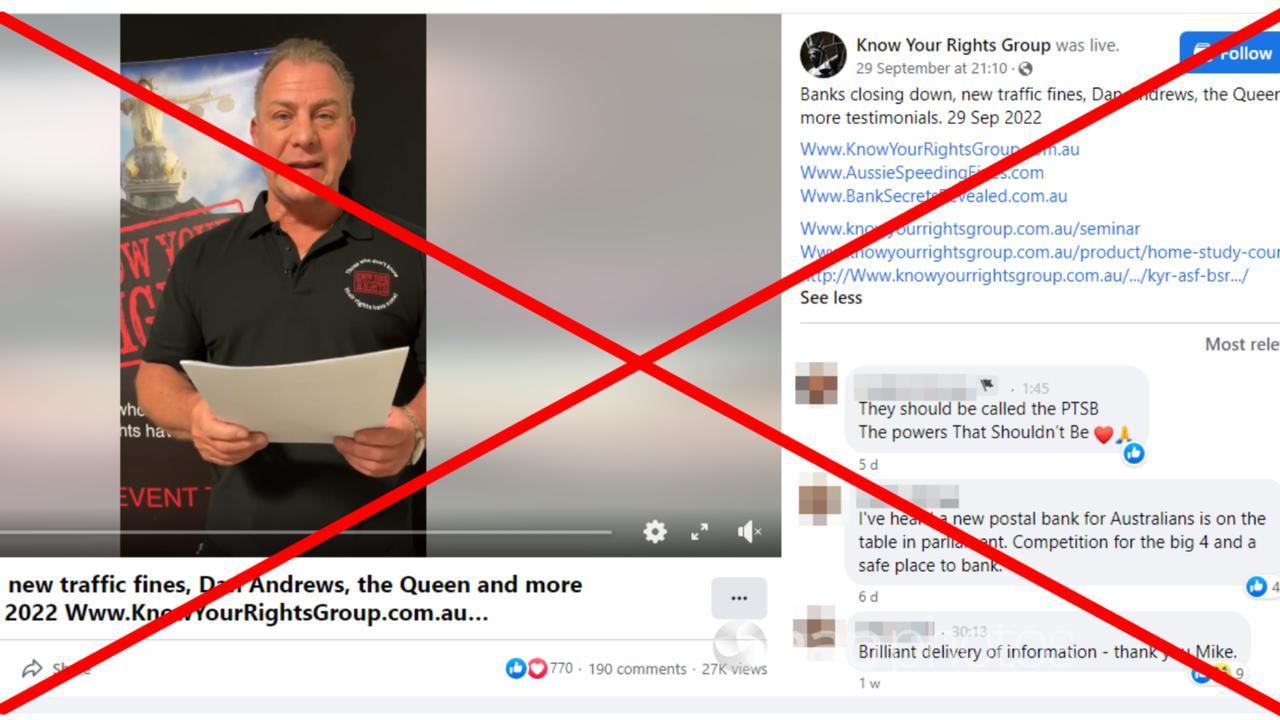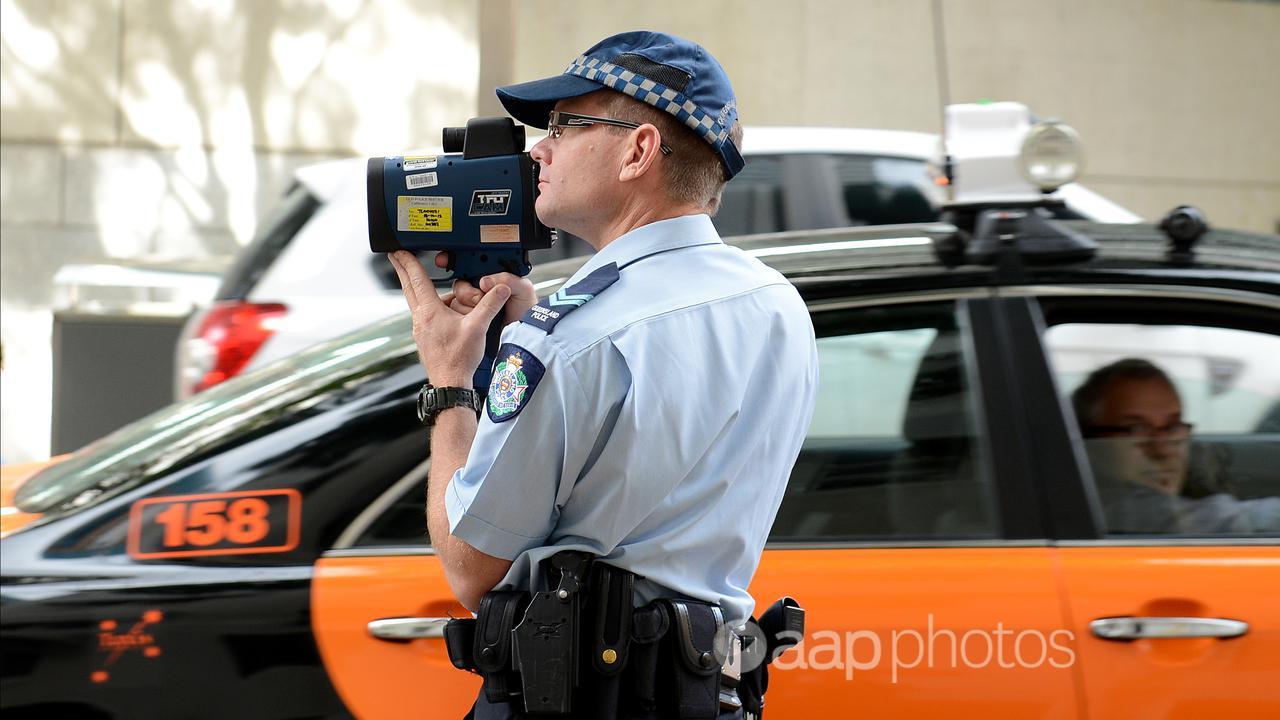A legal rights advocate claims a change to the Queen’s title in 1973 renders all traffic fines in Australia unlawful, as it doesn’t match how the monarch is referred to in the Constitution.
Unfortunately for motorists with speeding tickets, he has taken a wrong turn with this argument. Constitutional law experts told AAP FactCheck the claim is false, with one calling it “nonsense”.
Elizabeth II’s death on September 8 barely changed anything about how Commonwealth nations are run, and neither did a royal title change officially referring to her as the “Queen of Australia” almost 50 years ago .
In a Facebook video (screenshot here) posted on September 29, Mike Palmer from the Know Your Rights Group says: “The important point to make is that those fines, just like all other traffic fines, are completely unlawful because there is no head of power for the creation of them since the removal in 1973 to all references to the Crown or to the Queen of the United Kingdom of Great Britain and Ireland,” (video mark 14min 40sec).

In another video from September 8, Mr Palmer says his issue is the 1973 title change differs from how the Queen is referred to in the Australian Constitution, rendering subsequent laws invalid.
“There has been no lawful, valid head of power for either the creation or amendment of any laws since 1973 when of course the government of the day unlawfully removed all references to the Queen of the United Kingdom of Great Britain and Ireland and replaced them with this fictitious ‘Queen of Australia’,” he says (video mark 11min 10 sec).
In the preamble to the Constitution, the Crown is referred to as “the Crown of the United Kingdom of Great Britain and Ireland” and clause 2 says: “The provisions of this Act referring to the Queen shall extend to Her Majesty’s heirs and successors in the sovereignty of the United Kingdom.”
But in 1973, under Labor prime minister Gough Whitlam, the Queen’s title in Australia was amended under the federal government’s Royal Style and Titles Act to “Queen of Australia”.

Despite Mr Palmer’s claim the title is fictitious, the Queen herself signed the Act at Government House on October 19, 1973, changing the official style and title in Australia to “Elizabeth the Second, by the Grace of God Queen of Australia and Her other Realms and Territories, Head of the Commonwealth”.
Constitutional law experts say numerous High Court decisions show any confusion over the issue was settled decades ago and the claim is a fallacy.
Laureate Professor Emeritus Cheryl Saunders, from the University of Melbourne, told AAP FactCheck arguments like the one made in the video sought to “exploit the potential for confusion arising from the reality that Australia became fully independent in slow stages over the course of 20th (Century), after the Constitution was made”.
“The issue was raised before the High Court in 1998, in a case called Joosse v ASIC, and roundly rejected. It can be regarded as settled,” Prof Saunders said in an email.
Luke Beck, a professor of constitutional law at Monash University, says the claim is “complete nonsense”.
“The Royal Style and Titles Act is constitutionally valid and has nothing to do with traffic fines. Changing the monarch’s title does not impact the legitimacy of government,” Prof Beck told AAP FactCheck in an email.
He said the High Court made clear “every reference to the Queen in the Constitution needs to be read as being a reference to the Queen of Australia”, citing Nolan v Minister for Immigration and Ethnic Affairs (1988).
Point 10 of the judgment says: “We would add that, to the extent that there would otherwise be inconsistency in the use of the words ‘subject of the Queen’ in the Constitution, it should be resolved by treating those words as referring, in a modern context, to a subject of the Queen in right of Australia.”

Associate Professor Will Bateman, from the Australian National University, also told AAP FactCheck the video’s claim is inaccurate, saying the title change didn’t affect the validity of Commonwealth or state laws.
He cited comments by Chief Justice Gibbs in the High Court case of Southern Centre of Theosophy Inc v South Australia (1979) under point 15: “This alteration in Her Majesty’s style and titles was a formal recognition of the changes that had occurred in the constitutional relations between the United Kingdom and Australia.”
AAP FactCheck has debunked other claims from Mr Palmer, as seen here and here.
The Verdict
The claim traffic fines are unlawful in Australia because of the change to the Queen’s title in 1973 is false. Constitutional law experts told AAP FactCheck there is no basis in law for the claim, citing multiple High Court cases.
While the Constitution still refers to the Crown as that of “the United Kingdom of Great Britain and Ireland”, every reference to the Queen in the Constitution is read as being a reference to the “Queen of Australia”, the High Court says.
False – The claim is inaccurate.
* AAP FactCheck is an accredited member of the International Fact-Checking Network. To keep up with our latest fact checks, follow us on Facebook, Twitter and Instagram.
All information, text and images included on the AAP Websites is for personal use only and may not be re-written, copied, re-sold or re-distributed, framed, linked, shared onto social media or otherwise used whether for compensation of any kind or not, unless you have the prior written permission of AAP. For more information, please refer to our standard terms and conditions.


















